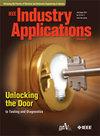基于MDSOGI的选择性虚阻抗在不平衡和畸变弱电网中并网逆变器控制与稳定性分析
IF 4.2
2区 工程技术
Q2 ENGINEERING, ELECTRICAL & ELECTRONIC
引用次数: 0
摘要
并网逆变器的普及率不断提高,单相微电网(MG)和三相微电网中不平衡负载的整合导致了电能质量问题,例如在非理想电网条件下共同耦合点(PCC)的电压谐波和不平衡。在弱电网中,电网阻抗也会增加,并影响系统的稳定性。本文针对畸变弱电网中的不平衡 MG,提出了一种基于多重双二阶广义积分器(MDSOGI)的新型 PCC 电压前馈控制方法,即选择性虚拟阻抗环(SVIL)。本文介绍了拟议 SVIL 的综合开发过程,包括基频虚拟正序/负序阻抗 (VPI/VNI) 环路和谐波频率虚拟可变谐波阻抗 (VVHI) 环路。VPI 和 VVHI 可改善低阶电压谐波,而 VNI 可调节 PCC 端的不平衡电压。此外,还评估了采用拟议控制的系统稳定性。针对畸变和弱电网中的不平衡 MG,使用控制硬件在环 (CHIL) 验证了所提方法的有效性,表明与现有方法相比,该方法改善了电能质量并提高了性能。本文章由计算机程序翻译,如有差异,请以英文原文为准。
Control and Stability Analysis of Grid-Connected Inverters in an Unbalanced and Distorted Weak Grid Using MDSOGI Based Selective Virtual Impedance
Increasing the penetration of grid-connected inverters and integration of single-phase microgrids (MG) and unbalanced loads into three-phase MGs result in power quality issues such as voltage harmonics and unbalance at the point of common coupling (PCC) under nonideal grid conditions. The grid impedance also increases in a weak grid and influences the system's stability. This paper proposes a novel PCC voltage feed-forward control method using selective virtual impedance loops (SVIL) based on multiple dual second-order generalized integrators (MDSOGI) for unbalanced MGs in distorted weak grids. The comprehensive development of the proposed SVIL including virtual positive/negative-sequence impedance (VPI/VNI) loops at the fundamental frequency and a virtual variable harmonic impedance (VVHI) loop at harmonic frequencies is presented. VPI and VVHI improve low-order voltage harmonics while VNI regulates the unbalanced voltage at the PCC terminal. In addition, the system stability with the proposed control is evaluated. The effectiveness of the proposed approach is validated using control hardware-in-the-loop (CHIL) for an unbalanced MG in distorted and weak grid, demonstrating improved power quality and better performance compared to existing methods.
求助全文
通过发布文献求助,成功后即可免费获取论文全文。
去求助
来源期刊

IEEE Transactions on Industry Applications
工程技术-工程:电子与电气
CiteScore
9.90
自引率
9.10%
发文量
747
审稿时长
3.3 months
期刊介绍:
The scope of the IEEE Transactions on Industry Applications includes all scope items of the IEEE Industry Applications Society, that is, the advancement of the theory and practice of electrical and electronic engineering in the development, design, manufacture, and application of electrical systems, apparatus, devices, and controls to the processes and equipment of industry and commerce; the promotion of safe, reliable, and economic installations; industry leadership in energy conservation and environmental, health, and safety issues; the creation of voluntary engineering standards and recommended practices; and the professional development of its membership.
 求助内容:
求助内容: 应助结果提醒方式:
应助结果提醒方式:


